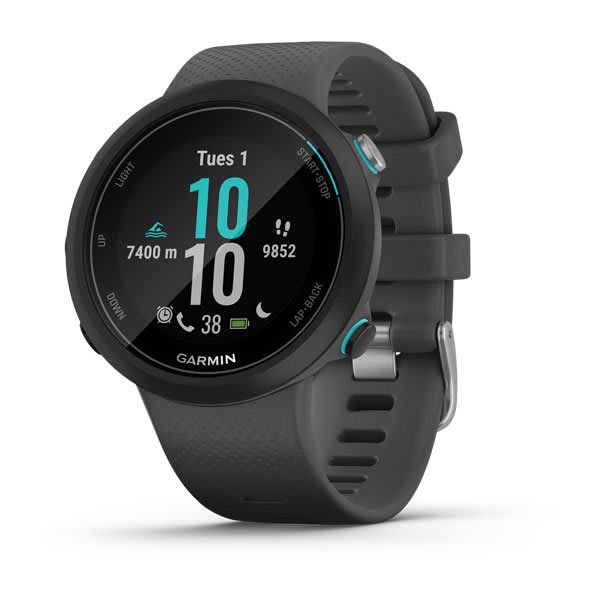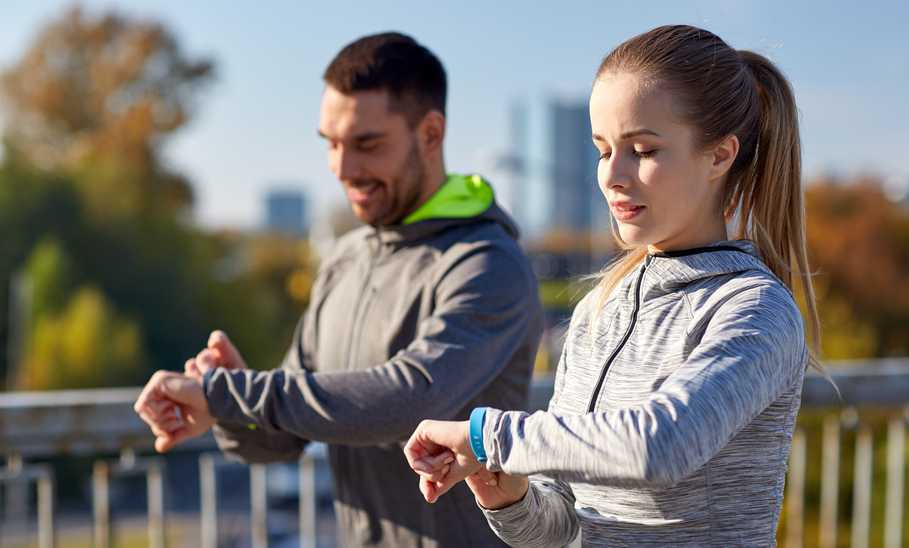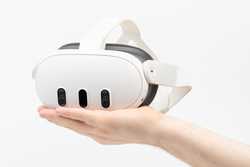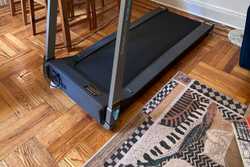Fitness trackers have come a long, long way since we first started counting 10,000 steps a day. You can purchase rings, watches, bands, and other pieces of tech to help you stay in shape, manage your sleep, monitor your heart rate, track those steps, count calories, and monitor other aspects of your health.
According to research done by Sutter Health, a not-for-profit integrated health delivery system headquartered in Sacramento, California, fitness trackers can help you not only get in shape, but also manage chronic conditions like diabetes, or monitor your heart for optimal health.
With so many options on the market, it can feel overwhelming, but deciding what you want your fitness tracker to do is the first step in finding the best one for you. In my case, it’s a simple Garmin Vivofit model that allows me to count steps and stairs, but most fitness buffs will want their tech to do a bit more—so here is a roundup of tools to help you biohack your way into good health.
Our top picks for the best fitness tracker

Fitbit Charge 6 Fitness & Health Tracker
25% offSave $40
This Fitbit is a compatible, hard-working option if you want to use a traditional tracker with your Android instead of a Google watch to track your stress, sleep, steps, cardio, menstrual cycle, skin temperature, and more. You can use it for up to a week without recharging it, and its slim design allows for easy wearing versus a clunkier watch. Plus, we love the built-in GPS.
Specifications
- Size (display and/or band): 1.04 inch display; small band fits wrists 5.1 - 6.7 inches in circumference, large band fits wrists 6.7 - 8.3 inches in circumference
- Weight: 1.33 ounces
- Battery life: Up to 7 days
- Display type: Full-color AMOLED
- GPS: Yes
- Connectivity: Bluetooth
- Water resistance: Yes (5 ATM rating)
- Music storage: Via your iPhone
- Price on publish: $159.95
Pros:
- Atrial fibrillation (AFib) detection
- Slim
- 40+ sports modes
- Hydration reminder
- Sleep score
- Both small and large bands are included
- Suitable for showering, swimming, diving, and snorkeling
The bottom line:
The Fitbit Charge 6 tracks many important health and cardio-related metrics and can even detect AFib.

Fitbit Inspire 3
20% offSave $20
Fitbit sells a great line of affordable options with not as many bells and whistles as some, but it gives you everything you need to cover basic health and fitness. Fitbit Inspire 3 measures steps and heart rate and has the bonus of letting you know your heart rate’s variability and stress. There’s no GPS (that’s why you own a phone), but you can connect it with your Fitbit premium subscription to access meditation sessions, nutrition plans, and more.
Specifications
- Size (display and/or band): 0.77 inch display; strap length 5.5 - 8.7 inches
- Weight: N/A
- Battery life: 10 days
- Display type: Face
- GPS: No
- Connectivity: N/A
- Water resistance: Yes (5 ATM rating)
- Music storage: No
- Price on publish: $99.95
Pros:
- Lightweight
- Inexpensive
- Pretty band color options
- Suitable for showering, swimming, diving, and snorkeling
Cons:
- May not do enough for serious trackers
The bottom line:
An affordable, lightweight, waterproof tracker that can help you monitor heart health.

Apple Watch Series 9
It should come as no surprise that the best fitness tracker for the iPhone is an Apple Watch. The Series 9 (like its predecessor) tracks heart rate, steps, calories, and other health-related metrics and is also a smartwatch. (Check out our guide on the best kids smartwatches if you’re looking for options for your children, as well.) This tracker is water resistant, so you can take it into the swimming pool, too. Choose the aluminum finish to save money, or upgrade to stainless steel.
Specifications
- Size (display and/or band): 41 mm or 45 mm display
- Weight: 31.9 - 38.7 grams (aluminum), 42.3 - 55 grams (stainless steel)
- Battery life: Up to 18 hours
- Display type: Watch face
- GPS: Yes
- Connectivity: Yes
- Water resistance: Yes (5 ATM rating)
- Music storage: Yes
- Price on publish: Starts at $399 and goes up
Pros:
- This will pair with the iPhone
- Works in other ways other than a fitness tracker, e.g. cycle tracking and emergency SOS
- Suitable for showering, swimming, diving, and snorkeling
Cons:
- Expensive
- Must have an iOS phone and account to use
The bottom line:
If you want a fitness tracker to seamlessly connect with your iPhone, an Apple Watch may be your best bet.
Fēnix 7 Pro Solar Edition
This fitness tracker watch comes with a serious price tag, but if you can afford it, this device will last you 22 days on a single charge thanks to its solar charging lens. If you like to work out hard under the sky, you can rest assured your device won’t die in a few days; plus, it comes with a built-in flashlight for your nightly runs, hikes, or mountain climbs. It also has SATIQ™ Technology and multi-band GPS, 24/7 health and wellness monitoring, along with performance features for serious adventure seekers. These include, but are not limited to, hill score, Climbpro tracking (for climbers), real time stamina data, grade adjusted pace metrics, and more.
Specifications
-
Size (display and/or band): 1.33 inch display; fits wrists with a circumference of:
Silicone band: 125 - 208 mm
Leather band: 132 - 210 mm
Fabric band: 132 - 210 mm
Metal band: 132 - 215 mm
-
Weight: 79 grams
-
Battery life: Up to 18 days in Smartwatch mode; up to 22 days with solar
-
Display type: Watch face
-
GPS: Yes
-
Connectivity: Bluetooth
-
Water resistance: Yes (10 ATM rating)
-
Music storage: N/A
-
Price on publish: $799.99
Pros:
- 22-day charge
- Uses solar technology
- Has all the bells and whistles
- 10 ATM rating makes it suitable for swimming, diving, and high-speed water sports
Cons:
- Expensive
- With so many features, it could be overwhelming for some
The bottom line:
This is for the pros who can afford its price, and with a single 22-day charge thanks to solar technology, you can use it for long treks away from home.

Garmin Lily Sport Edition
Stylish and functional, the Garmin Lily is a reliable fitness tracker that can be purchased in rose gold (or other finishes) that measures steps, sleep, stress, calories, and more. It’s also water-resistant up to 164 feet underwater—a huge bonus for stylish swimmers. It even gives wearers a daily “morning report”, including calendar events, the weather, and step goals. Pair it with Garmin apps to enjoy a robust tracking experience, plus you can choose your band and watch face to suit your style, too.
Specifications
- Size (display and/or band): 1 inch x 0.84 inch display; fits wrists with a circumference of 110 - 175 mm
- Weight: 24 grams
- Battery life: Up to 5 days (Smartwatch mode)
- Display type: Watch face
- GPS: Yes, with a compatible smartphone
- Connectivity: Bluetooth
- Water resistance: Yes (5 ATM rating)
- Music storage: No
- Price on publish: $249.99
Pros:
- Options for watch face and band
- Its many features, including a “morning report”
- Women’s health tracking
- Corning Gorilla Glass lens
- Suitable for showering, swimming, diving, and snorkeling
Cons:
- Battery life is only five days
- Works best with the Garmin app
The bottom line:
A stylish (dare I say pretty) waterproof fitness watch that tracks sleep, calories, steps, heart health, oxygen levels, and more from Garmin.
Best fitness ring and best fitness and sleep tracker: Oura Ring

Oura Ring
Oura is one of the OG’s (if not the OG) of fitness rings. It debuted in 2015, and since then, you can find it on the fingers of fitness buffs, celebrities, and everyone else who can afford its higher price point. It comes in four finishes and two styles, and no matter what you select, it still looks like a discreet wedding band.
Oura is now in its 3rd generation and is still tracking things like your body temperature, heart rate, sleep duration, blood oxygen, and more. If you want to hack your health discreetly, the stylish Oura ring beats clunkier fitness trackers. However, this tracker was really designed to help you track your sleep and health versus steps and calories, so if those latter assets are the things that excite you the most, you may want to buy something else.
You must also subscribe to the Oura app, which costs around $70 to access your information and data from the ring. This won two categories for me because not only is it a stylish ring, but it’s also one of the best sleep trackers on the market. (For more about Oura and other similar trackers, see our round-up of the best smart rings.)
Specifications
- Size (display and/or band): 8 band sizes available; plus, you can order a free sizing kit
- Weight: 4 to 6 grams
- Battery life: Fully charged ring could last up to 7 days
- Display type: N/A, must check info via the app
- GPS: N/A
- Connectivity: Connects to your phone/Bluetooth
- Water resistance: Yes (10 ATM rating)
- Music storage: N/A
- Price on publish: Starts at $299 and goes up, plus an annual subscription
Pros:
- Excellent tool for improving and understanding your sleep
- Tracks many health measures: heart health, pulse oxygen, etc.
- 10 ATM rating makes it suitable for swimming, diving, and high-speed water sports
Cons:
- Expensive
- You have to purchase an annual subscription to its app
- Isn’t as well-reviewed for generic fitness tracking
The bottom line:
A sleek, stylish, and comfortable (and waterproof) ring that can track 20 biometric signals—all from your finger.
Best waterproof fitness tracker: Garmin Swim 2

Garmin Swim 2
Garmin’s Swim 2 is expensive but worth it if you enjoy aquatic sports and fitness, from swimming pools to open water, offering two modes for each type of swimming. There is a built-in GPS for swimming in open water, like lakes, oceans, and rivers, and SWOLF for pools to gauge your swimming efficiency. This tracker measures distance, stroke count, pace, and more for serious swimming workouts.
It also contains advanced features when paired with the Garmin app, and the watch monitors underwater estimated wrist-based heart rate during swim activities, so you can track your heart rate during sessions. This tracker is waterproof, not water resistant like some trackers (or smartwatches), because it is designed specifically for the water. Shopping tip: If you’re a dedicated swimmer looking to upgrade your workout gear, consider something from our list of the best waterproof headphones.
Specifications
- Size (display and/or band): 1.04 inch display; fits wrists with a circumference of 129 - 197 mm
- Weight: 1.2 ounces
- Battery life: Up to 7 days (Smartwatch mode), 13 hours (GPS mode), 72 hours (pool mode)
- Display type: Watch face
- GPS: Yes, built-in GPS for open water swimming
- Connectivity: Can be paired with a compatible smartphone
- Water resistance: Yes (5 ATM rating)
- Music storage: N/A
- Price on publish: $249
Pros:
- A waterproof watch that works great in open water or the local pool
- Measures all the metrics swimmers need
- Large replacement band available for wrists with a circumference of 151 - 219 mm
Cons:
- It may be bulky on some wrists
The bottom line:
This is a waterproof fitness tracker watch designed for serious swimmers who perform aquatic sports in the pool or open water.
How we selected the best fitness trackers
Expert advice and use of products
To create our list of the best fitness trackers, I tried some out myself and spoke with fitness trainers. I asked the professionals what to consider when shopping for and what brands they use.
A variety of budgets
I reviewed a cross-section of trackers at different price points and compared them to create a list with options at every budget.
Diversity of features
The trackers that made the cut all came with a diverse set of features, such as monitoring oxygen, heart rate, calories, counted laps, sleep, location, and even menstrual cycles, to make them stand out in a saturated market of fitness trackers. These are not your average count-your-step fitness bands!
What to consider when choosing a fitness tracker
There are a few things to consider before buying a fitness tracker, including the type of wearable you want and how you will use it. Before you buy one, ask yourself the following questions:
How do I plan to use this fitness tracker?
Some trackers are designed for swimmers, and others are designed for runners. Think about how you plan to use your fitness tracker. Do you want it to track your sleep, calories, steps, or miles?
According to research done by UCLA Health, an LA-based health system connected to the David Geffen School of Medicine at UCLA, fitness trackers, when paired with personalized feedback and encouragement from health coaches and medical professionals, can result in “sustained improvements” in sleep and exercise when users of wearable devices received customized texts and messages. These may be available via apps connected with some wearable devices.
While simply wearing a device may not produce long-term fitness results, using one may bolster efforts to focus on health. UCLA’s research indicated that “integrating wearable devices into more comprehensive, personally tailored behavioral interventions improves compliance and behavior change.”
Of course, finding the right fitness tracker is key, just like finding the right workout shirts. To do that, it’s important to think about your fitness routine, from HIIT workouts to running stairs. Your fitness tracker should be compatible with the sports and exercise you love to do. For example, if you workout in the water, your device should be waterproof. If you lift weights or run for exercise, you may want a heart rate monitor. If sleep concerns you, some trackers will help you develop better sleep habits by tracking your rest.
How much can I afford to spend?
There are budget fitness trackers that collect basic data and there are even free step counter apps that you can access on your phone. The more bells and whistles you want in a fitness tracker, the more expensive it will be.
Do I care about fashion or just form?
My Garmin is slim and black, but I can change the band to purple or blue (depending on my mood). I once owned a rose-gold Fitbit because I loved the color. Some friends love their fashionable and attractive fitness watches. Think about what constitutes fashion for you and how important a color or band size (I prefer something slim) is to you.
How does it charge?
I charge my tracker via my laptop, which can be annoying when I’m traveling. Others come with a self-charging station. Determine how complicated (or uncomplicated) you want your charging situation to be, and always consider how long a charged device will last.
Is it compatible with my phone?
I’m a firm believer that a fitness tracker should be compatible with your phone, especially because most trackers have paired apps or websites. There are so many good fitness tracking devices out there—it shouldn’t be too hard to find the best one to pair with your Android or iPhone.
Frequently asked questions (FAQs)
Which fitness tracker has the best GPS?
There are a few fitness trackers with great GPS systems, including the Garmin Fenix 7 Pro Solar and the Garmin Forerunner 955.
Which fitness tracker does not require a subscription?
There is a movement towards fitness trackers requiring a subscription for optimum support and use, but you can find trackers from Garmin and Fitbit that do not require a subscription.
Do doctors recommend fitness trackers?
Some doctors may recommend fitness trackers. It depends on the doctor.
Is Garmin better than Fitbit?
Garmin and Fitbit both sell high-quality fitness trackers. The one you like the best depends on your personal preference.
The information presented here is created by TIME Stamped and overseen by TIME editorial staff. To learn more, see our About Us page.











